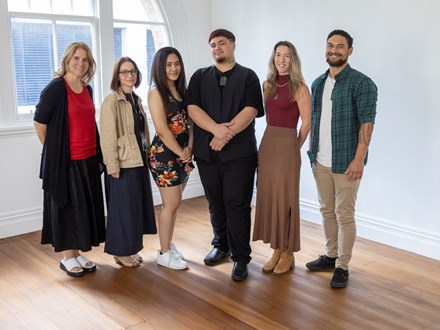Pictured: Danielle Newton and members of Te Taiwhanga Rangatahi and The Southern Initiative Team
Ko Dani tōku ingoa. I’m leading the work of the Sustainable Business Network (SBN) on learning, skills-building and careers in mahi tiaki taiao (caring for the environment).
SBN is working with our partners to nurture a unique place-based approach to vocational education. We’re providing training and employment that supports the regeneration of Te Puhinui - the wellbeing of the awa, the catchment and its people.
Foundational to this mahi has been engagement with rangatahi (young people) to understand what a meaningful career pathway in mahi tiaki taiao looks like for them. Rangatahi of Taamaki ki te tonga (South Auckland) are bringing culturally grounded, whenua and kinship-based innovative approaches to this initiative.
Makaurau Marae and the Awa Rangers are leaders on this. Collectively, we aspire to contribute to a rejuvenated local education and employment ecosystem. One that values indigenous and culturally appropriate approaches to learning how to inhabit and evolve our urban environments.
Innovation partners, Te Taiwhanga Rangatahi with The Southern Initiative, describe this as an ‘economy of mana’. This begins by nurturing mana-enhancing relationships across sectors. It enables the reciprocal learning necessary for regeneration.
We’ve been learning alongside our collaborators how we can create paid, high quality opportunities for young people. These will focus on how to grow mana motuhake - self-determination.
This demands diverse voices and role models. Together, we can inform and empower more inclusive industry practice. Collectively we will demonstrate how to work with the innate potential of communities, landscapes and ecosystems.
We’re exploring the opportunities and challenges. We’re connecting with youth groups and innovators, community initiatives, educators, employers in green business, mentoring and career support. We also work closely with Auckland Council and Central Government.
We’re learning from what has already been done, the lived experiences of locals, and Maatauranga Maaori. We’re working to co-design and test solutions with real people. We do this so that everyone involved can learn and upskill in tangible and relevant ways.
We have a strong focus on labour market entry and progression for the people of South Auckland. This will help to ensure this work contributes to making a material difference to enduring economic well-being.
An important part of this mahi is identifying the transferable skills needed for industry in the Puhinui catchment. This will ensure we can best leverage public agency infrastructure investment. We’re working with Eke Panuku Development, Healthy Waters, Kāinga Ora and many others. Together, we’re helping to grow the talent that matches the needs.
Training to gain these valuable skills needs to be accessible and adaptive. The Jobs for Nature kaupapa has set a great foundation for this. We’re working with our partners to make the most of the local opportunities and expertise in the catchment. We’re co-creating a tailored Puhinui-based education and vocational training programme for mahi tiaki taiao. The Awa Rangers and Te Taiwhanga Rangatahi show us that this learning must be grounded in Maatauranga Maaori, including alignment with the maramataka. We support learning of conservation skills from a Te Ao Maaori worldview through connection with local iwi and marae-based education. We look to awhi (support) local iwi collective Te Waiohua to lead on this.
Manurewa High School is already miles ahead. It’s working with Resilio Studio, Taiwhanga Rangatahi and others on a series of intentional waananga. These aim to ensure rangatahi have the opportunity to deeply explore Te Whakaoranga o Te Puhinui - The Puhinui Regeneration Initiative. This is done through hands-on practical experiences in the local environment and learning from inspiring projects. It exposes young people to a range of career pathways and professionals involved in the regeneration of Te Puhinui. It also connects with places such as Puhinui Reserve, Botanic Gardens and Te Aka Raataa. Social procurement led by Eke Panuku has been key to enabling these opportunities. We have also been working alongside others in the Auckland Council whaanau. This includes Sustainable Schools, which ran a Sustainability Career Pathways pilot with South Auckland Enviroschools last year.
We must continue to open doors for South Auckland rangatahi. It’s important that they experience green employers, meet people in these roles, and imagine these spaces are for them. We must re-imagine a green gateway, connecting green employers and including paid work experience and micro-credentials. This includes earn while you learn traineeship programmes to support upskilling and employment of local people.
Most importantly, we are guided by our local partners, The Awa Rangers, Makaurau Marae nursery, and Te Taiwhanga Rangatahi. They‘re demonstrating that systems change and growth in entrepreneurialism are necessary. They also exemplify the manaakitanga (reciprocal care) required. Tuakana-teina mentoring and whaanau-centred approaches are fundamental to providing the wrap-around support that is critical for this change.
We also need local employers to be onboard with the reciprocal care and learning required for regeneration. SBN can facilitate industry discussions, and partner to enhance cultural competency and pastoral care. Business people need support to better recognise and value cultural knowledge and practices. We’ll work with our partners to ensure business is able to identify what Maaori capacity and capability looks like, and that it is given the appreciation it deserves.
SBN is eternally grateful for our partners, who walk alongside us so graciously on this journey. We have the utmost respect for the people of Te Puhinui. Their passion for their place. The way they see and move through te ao hurihuri, the changing world. Our promise is to actively share that respect and care. We’ll continue to advocate for a future that nurtures resilience, equity and social and ecological justice.

